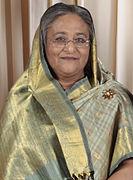2014 Bangladeshi general election
|
|
|||||||||||||||||||||||||||||||
|---|---|---|---|---|---|---|---|---|---|---|---|---|---|---|---|---|---|---|---|---|---|---|---|---|---|---|---|---|---|---|---|
|
|||||||||||||||||||||||||||||||
|
All 300 seats in the Jatiya Sangshad 151 seats are needed for a majority |
|||||||||||||||||||||||||||||||
|
|||||||||||||||||||||||||||||||

|
|||||||||||||||||||||||||||||||
|
|||||||||||||||||||||||||||||||
General elections were held in Bangladesh on 5 January 2014, in accordance with the constitutional requirement that the election must take place within the 90-day period before the expiration of the term of the Jatiya Sangshad on 24 January 2014. The elections were controversial, with almost all major opposition parties boycotting and 154 of the total 300 seats being uncontested. Around 21 people were killed on election day.
The elections were preceded by government crackdown on the opposition and BNP and Opposition leader Khaleda Zia was put under house arrest. There were also widespread arrests of opposition members, violence and strikes by the opposition, attacks on religious minorities, and extrajudicial killings by the government.
The elections were criticized by the US, UK, EU and the UN.
Throughout most of 2013, Bangladesh Nationalist Party and its alliance of 18 opposition parties led by three-time former Prime Minister and Opposition Leader Khaleda Zia called more than 85 days of nationwide general strikes and blockades that brought the entire country to a grinding halt. The opposition demanded that the ruling Awami League party led by the current Prime Minister Sheikh Hasina amend the constitution, dissolve the parliament after their full five-year term ended on 24 January 2014, and then hand over power to a non-partisan interim government or a caretaker government that would be run by technocrats for 90 days. The job of a Caretaker Government of Bangladesh would then be to work in tandem with the Bangladesh Election Commission by helping them to organise, arrange, and oversee the general election held on 5 January and transfer power to a newly elected government. As most of the demands were not met within the stipulated time frame, all opposition parties boycotted the polls. Hasina had offered an all party interim election cabinet government which would include opposition parties till the election but this was rejected by Zia.
...
Wikipedia


